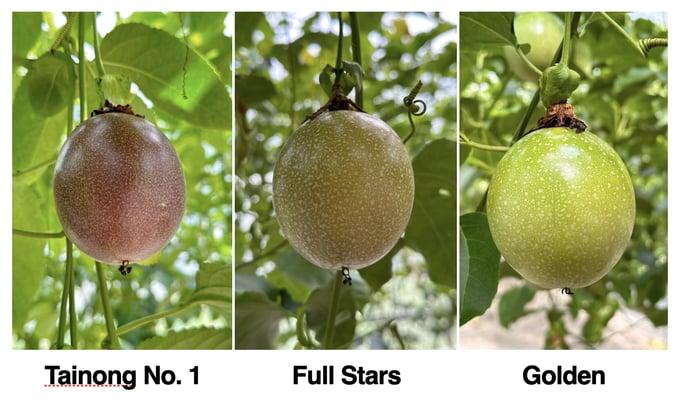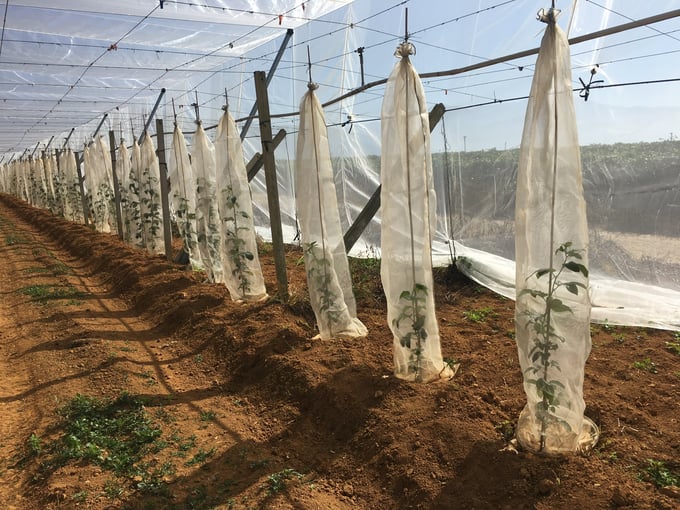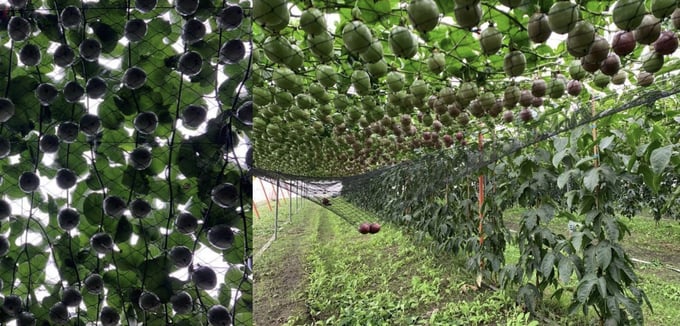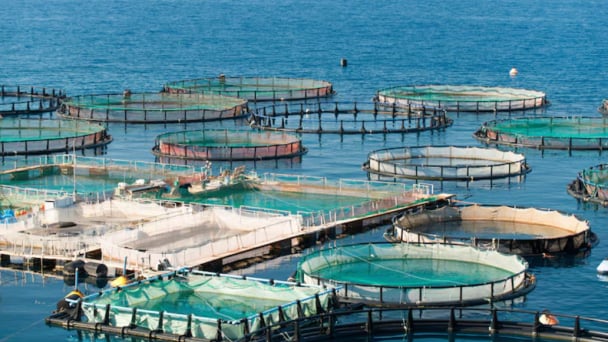June 6, 2025 | 08:54 GMT +7
June 6, 2025 | 08:54 GMT +7
Hotline: 0913.378.918
June 6, 2025 | 08:54 GMT +7
Hotline: 0913.378.918
On July 2-3, 2024, in Gia Lai, the Vietnam Academy of Agricultural Sciences (VAAS) collaborated with the Asia-Pacific Food and Fertilizer Technology Center (FFTC-ASPAC) to organize an international workshop on “Strengthening Quality Management for the Passion Fruit Value Chain in the Asia-Pacific Region.” Many significant papers on the development of passion fruit in the region were presented, followed by Q&A sessions. Vietnam Agriculture News has translated, compiled, and respectfully introduced these to our readers.
In 2023, Taiwan’s passion fruit cultivation area spanned 954.6 hectares. Cultivating passion fruit in subtropical climates requires innovative production methods to ensure high quality and yield.
The main variety, Tainong No.1, developed by the Taiwan Agricultural Research Institute (TARI), is a top choice. With a distinctive aroma and a sugar content ranging from 15-19° Brix, this variety is suitable for both fresh consumption and juice processing and can be grown at altitudes up to 600 meters above sea level. Tainong No.1 has a high yield, producing approximately 20 tons per hectare, meeting the demands of large-scale production and product diversification.
In addition to Tainong No.1, the Full Stars and Golden varieties are also popular in Taiwan's passion fruit cultivation. Full Stars, with larger fruits (80-120g) and thicker skin than Tainong No.1, along with low sweetness and acidity, is well-suited to the climate conditions and market requirements. Meanwhile, the Golden variety, known for its strong flavor and low acidity, is ideal for juice production and is favored for its large fruits and thick skin.

Three popular passion fruit varieties in Taiwan.
However, the passion fruit industry in Taiwan faces several challenges, including virus infections, particularly the East Asian Passiflora Virus (EAPV), which causes corkscrewing or deformed fruit skin. This not only reduces productivity but also significantly impacts the commercial value of Taiwanese passion fruit products.
To address the challenges in passion fruit cultivation in Taiwan, researchers have identified several scientific solutions.
Virus-free grafted seedlings not only ensure the health of the mother plant but also minimize the risk of virus transmission to the crop. Using high-quality and certified grafted varieties will improve the yield and quality of the final product.
In addition, disease control and management are crucial in dealing with viral infections. Preventive measures and early treatment will help minimize damage and protect crop growth, ensuring the harvest of ripe, high-quality fruit.
Replacing plants with new ones every year and protecting young plants with nets is a solution to combat infectious diseases. This should be done in late winter when pest density is lowest, ensuring that new plants can grow vigorously and are not affected by viruses from the old plants.

Growing passion fruit in Taiwan requires basic construction stages to cover seedlings with mosquito nets to limit virus attacks. Photo: Ho Huy Cuong.
Additionally, the removal of wild Passiflora species such as Passiflora suberosa and Passiflora foetida is a necessary measure to prevent the spread of diseases and viruses. This is a key component of the main disease control and crop protection strategy.
Implementing these solutions will help the passion fruit industry in Taiwan achieve sustainability and development, ensuring both productivity and product quality. Strict adherence to these measures will also bring higher economic benefits to farmers and industry participants.
Researchers have also introduced a new measure to extend the production window for Taiwan’s passion fruit industry. Specifically, growers in southern Taiwan have been instructed to use artificial lighting technology instead of relying solely on sunlight. This innovation allows passion fruit to be grown year-round, rather than just during the traditional season.
The application of this technology has opened a new production period for growers in southern Taiwan, lasting from February to June. Currently, about 100 hectares of spring passion fruit have been planted in Kaohsiung and Pingtung, with an expected annual output of 2,000 tons.

Off-season farming techniques to expand production season for Taiwan's passion fruit industry.
To manage diseases and improve productivity, researchers and passion fruit growers in Taiwan have adopted sustainable practices such as integrated pest management (IPM) and the use of organic materials to minimize the use of chemical pesticides. The application of beneficial microorganisms is also considered one of the important strategies to improve the yield and quality of passion fruit.
Microorganisms play a crucial role in the disease management of passion fruit crops in Taiwan. The bacterial strain Bacillus amyloliquefaciens (Tcba05) has been used effectively to control diseases such as anthracnose (Colletotrichum gloeosporioides) and brown spot (Alternaria sp.), which commonly affect the leaves and fruits of passion fruit, causing widespread brown spots.

Technique of harvesting ripe fruit that falls naturally from the tree using fruit support net.
Weekly spraying of the Tcba05 strain from July to October has significantly reduced the incidence of disease, with results comparable to the use of the fungicide Azoxystrobin (23%). This demonstrates that the effectiveness of microorganisms in disease control is on par with traditional chemical methods.
Additionally, the use of microbial fertilizers containing Trichoderma spp. plays an important role in enhancing resistance to stem rot and providing essential nutrients to the soil, thereby increasing crop yield and quality. The antagonistic fungi Trichoderma spp. decompose waste and organic matter, releasing nutrients and supporting plant growth.
Studies have shown that foliar sprays and soil drenches of Trichoderma spp. at concentrations ranging from 0.33% to 2% yield positive results. In particular, combined foliar sprays and soil drenches at 1% have increased yields by 31% to 39%, without causing significant differences in plant length, width, and number of leaves.
In summary, the application of microbial plant protection measures and organic fertilizers not only improves productivity but also enhances plant resistance, ensuring sustainability and efficiency in passion fruit production in Taiwan.
Translated by Quynh Chi

(VAN) Technology is redrawing the map of Vietnamese aquaculture: more modern, greener, and more sustainable.

(VAN) Novel process harnesses machine learning to reveal groups of genes that determine how efficiently plants use nitrogen.

(VAN) Several scientists and farmers are experimenting with soil treatment in some key durian-growing regions such as Cai Lay (Tien Giang), Dak Song, Gia Nghia, and Dak R’lap (Dak Nong).
/2025/05/25/4127-3-073637_820.jpg)
(VAN) Thanks to the promotion from an FAO-implemented project, vegetable production in greenhouses in Moc Chau has seen strong development, from 1.5 hectares in 2021 to nearly 50 hectares in 2024.

(VAN) FAO has recently supported USD 140,000 to implement the project 'Risk mitigation human-animal interface risks through disease control initiatives in pig farming.'

(VAN) The People's Committee of Tra Vinh province has approved an adjustment to the investment policy for the Green Hydrogen Plant project, increasing its area to approximately 52.76 hectares.
![Reducing emissions from rice fields: [2] Farmers’ commitment to the soil](https://t.ex-cdn.com/nongnghiepmoitruong.vn/608w/files/news/2025/05/05/dsc08881jpg-nongnghiep-140632.jpg)
(VAN) Clean rice cultivation model in Thuong Tan commune, Bac Tan Uyen district, is assisting local residents in achieving sustainable agriculture by substantially reducing costs, increasing productivity, and protecting the environment.